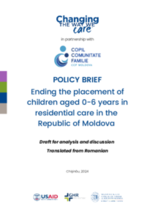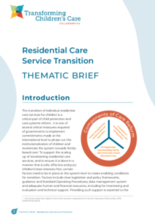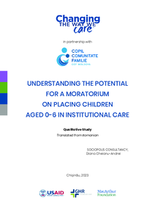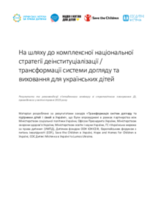Displaying 1 - 10 of 669
The Moldova Ministry of Labor and Social Protection, in cooperation with CTWWC Moldova and local partner CCF Moldova, organized an international conference on March 21, 2024. More than 100 participants, representing the wide array of care reform actors and decision makers in the central and local government, NGOs, academia and international experts, reviewed findings of the Bucharest Early Intervention Project and national research conducted in 2023 on the potential for a moratorium on placing children 0-6 in institutional care.
Foaia de parcurs pentru încetarea plasamentului copiilor din grupa de vârstă 0-6 ani în îngrijire rezidențială este un instrument care asigură toate componentele îngrijirii protectoare ale copilului: sănătate, alimentație adecvată, îngrijire, siguranță și educație timpurie, prin colaborarea intersectorială dintre Ministerul Muncii și Protecției Sociale, Ministerului Sănătății, Ministerul Educației și Cercetării și autoritățile administrației publice locale.
This is a tool that ensures all components of child protective care: health, adequate nutrition, care, safety and early education, through the intersectoral collaboration between the Ministry of Labor and Social Protection, the Ministry of Health, the Ministry of Education and Research and local public administration authorities.
The webinar took place on 30 April 2024 and focused on Chapter IV of the Guidelines: Deinstitutionalization grounded in the dignity and diversity of persons with disabilities, and how they relate to children and other children and other at-risk populations, such as elders and women.
Disability Rights International, as part of the Global Coalition on Deinstitutionalisation (GC-DI), organized a series of thematic workshop on the UN Guidelines on Deinstitutionalization, including in emergencies.
This study aimed to investigate the state of transformation of the child welfare service providers for neglected children in the City of Bandung as a parameter to understand the progress of the deinstitutionalization process in Indonesia.
This brief contains high-level guidance and recommendations for policy and decision-makers and development partners to consider in designing frameworks to scale up, coordinate and support the transition of individual residential care services.
This study analyzes statistical data on the institutionalization of children aged between 0-6 years; examines current practices of prevention, identification, assistance, referral, and placement in institutions and family based alternative care; evaluates the knowledge and attitudes of professionals and decision makers and outlines recommendations for the development and introduction of a moratorium on placing children aged between 0-6 years in residential care.
У рамках цього процесу Міністерство соціальної політики України об’єднало зусилля з широким колом представників громадянського суспільства для проведення п’ятиденного навчання та інтенсивного стратегічного планування деінституціалізації протягом квітня та травня 2023 року. У цьому документі представлені ключові висновки та рекомендації, зроблені під час п’ятиденного обміну думками та стратегічного планування. Ми сподіваємося, що ці рекомендації стануть основою для процесу стратегічного планування уряду, а також допоможуть донорам визначити свої пріоритети. Всі учасники висловили побажання, щоб цей захід став «останнім поштовхом» до повної трансформації системи догляду та виховання та назавжди поклав край інституціалізації дітей в Україні.
During April and May 2023, the Ukrainian Ministry of Social Policy joined forces with a broad range of civil society actors to facilitate five days of learning and intensive strategic planning on deinstitutionalization. This document presents the key findings and recommendations from those five days of exchange of ideas and strategic planning. It is hoped that these recommendations will inform the government’s strategic planning process, as well as providing insight for donors to inform their priorities.








